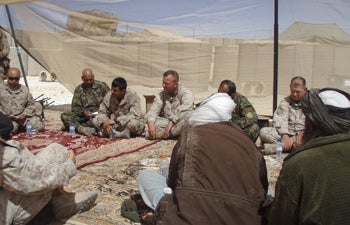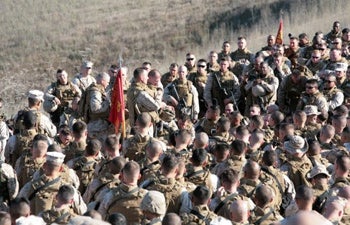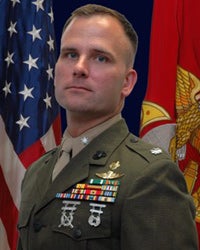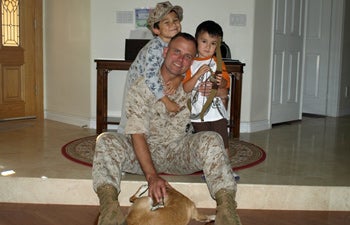Semper Fidelis (Always Faithful)
In a rural, poppy field-filled area outside Lashkar Gah, Afghanistan, Lt. Col. Russell Todd Zink sat with village elders under a tent in the hot desert sand. It was his first shura — a consultation meeting — with the local leaders.
“I sat on a rug across from these men eating lamb and rice with my fingers like they did,” Zink wrote from Camp Leatherneck, Afghanistan. “I listened carefully to what the villagers had to say and found them to be sincere.”
A USC College alumnus, Zink is commanding officer of more than 800 Marines and Navy corpsmen in Houston’s 1st Battalion, 23rd Marines known as the Lone Star Battalion. During their seven months outside Lashkar Gah, they have the harrowing task of building a credible government to replace Taliban rule. The first phase of the military offensive in southern Afghanistan — to release the area from insurgent control — had largely ended before their arrival late February. Still, violence is ever-present.
Two days before Zink gathered with the elders, a British soldier was killed by a roadside bomb in a valley 1.2 miles south of their meeting spot. The death made Zink more determined, if that was possible.
“This is just one example of the daily complexities we face in this war,” Zink wrote. “We’re creating enough stability so that Al Qaeda will never be able to have sanctuary here again.”

Zink (center) begins his first shura — a consultation meeting — with the local leaders in a village outside Lashkar Gah, Afghanistan. Photo courtesy of Russell Todd Zink.
That day, the elders, officers in the Afghan Army and a mullah — religious leader — told Zink their plan to start a tent school in their village. One elder told Zink that the Taliban may have one bullet to kill.
“But with education, I will have three,” the elder said.
“The pen is mightier than the sword,” Zink offered as a comparison.
Zink’s battalion is working with the Provincial Reconstruction Team, a unit formed by the United States comprised of military officers, diplomats and reconstruction experts, to find funding to hire a local instructor for the children. In an effort to disrupt the Taliban’s ties to the community, the battalion is teaching the people how to heighten security through community watch programs. Afghanis are also taking steps to provide education, health care, law enforcement and public works to improve their economy.
While training at Camp Pendleton, Calif., the battalion received countless hours of training in Afghani culture, Zink wrote.
“The Marines understand that by respecting the culture they have the opportunity to earn the trust of the local Afghan people,” Zink said, adding that although interpreters are embedded with them everyone took lessons in Pashto and Dari taught by Afghan instructors.

Zink, center toward left, addresses the Lone Star Battalion, which is working with the Provincial Reconstruction Team in Afghanistan — a unit formed by the United States comprised of military officers, diplomats and reconstruction experts — to teach Afghanis how to heighten security through community watch programs. Photo courtesy of Russell Todd Zink.
It was crucial for the squads to learn the social hierarchy in Afghanistan so they can identify the powerful and most influential people in villages. As commanding officer, Zink plays a pivotal role.
“I’m responsible for everything the battalion does and fails to do,” Zink wrote. “One of the biggest parts of my job was to train the Marines to fight in a very dynamic and complex counter insurgency in which the battle is being shouldered by my small unit leaders walking on patrol.”
When he’s not providing guidance to his companies, Zink is building a coalition with the British, the Danes, the Afghan Army and the Baharanians. This is his second tour as a reserve Marine. He’s been a reservist since 1999 after 7 1/2 years on active duty.
“I didn’t think I would join the reserves when I first got out,” Zink wrote. “But after several months of allowing my hair to get long I decided to go back to the infantry with a Force Recon unit. As the saying goes, once a Marine, always a Marine.”
Three months after Sept. 11, Zink was deployed as part of Quick Reaction Force, meant to quell further attacks on the U.S. After one year, he was sent to Iraq as part of the vanguard with the 1st Marine Division to take Baghdad. Prior to being a reservist, he served in combat in Somalia.

Lt. Col. Russell Todd Zink has been a Marine reservist since 1999 after 7 1/2 years on active duty. He’s served in Iraq, Somalia and now Afghanistan.
“It is not easy to go back to war,” Zink wrote. “It is not something I look forward to, but I feel that with all my military experience over the years that I can make a difference for the better for my Marines and the outcome of the war.”
Back home in Los Angeles, Zink has a wife and two boys, ages 6 and 4.
“They are my life,” he wrote. “My wife is truly remarkable. I have known her for more than 14 years and she has not once complained about my service in the Marine Corps. It might have to do with the fact that she lost her father in Vietnam and her mother brought her and her sister to this country.”
Zink’s wife Christon Brooks-Zink is a Vietnam native whose father served with the South Vietnamese Army as a commander. Toward the end of the war, he was killed and his widow brought Christon and her sister to the U.S. where both earned advanced degrees.
When not on reserve duty, Zink is a deputy district attorney at the Los Angeles County District Attorney’s Office.
“In some ways the jobs are similar,” he wrote. “Both positions ask me to do what is right. The biggest difference is that instead of answering to the people in L.A. County, people I do not know, as a commander I serve my Marines — many of whom I have come to know very well. Although both involve serving people, one is much more personal since I consider them my brothers in arms.”

Zink says good bye to his sons, Hunter, 6 (left), and Connor, 4, and his family’s rescue dog, Lucky, at his and his wife’s Los Angeles home before his deployment to Afghanistan. Photo courtesy of Russell Todd Zink.
The alumnus has met fellow Trojans in Afghanistan. Recently at Camp Leatherneck, Zink became acquainted with a former USC professor, John Garofano, who was on a fact-finding trip as dean of the U.S. Naval War College in Newport, R.I.
“We smoked some cigars and spoke about what we think the war is all about,” Zink wrote.
While a student at USC College, Zink was in the Naval Reserve Officers Training Corps (NROTC) program. He graduated with a bachelor’s in political science and economics in 1991.
In 2009, he was initially selected to take command of an infantry battalion headquartered out of Pasadena, Calif. But an unexpected opening occurred for the infantry battalion in Texas scheduled to deploy to Afghanistan. When the division general asked him to take command of the Lone Star Battalion, he talked it over with his wife, then agreed.
Zink copes on a day-to-day basis, “by focusing on doing the best job you know how so that you will never let down your fellow Marines when the time comes.”
It’s what Marines do.